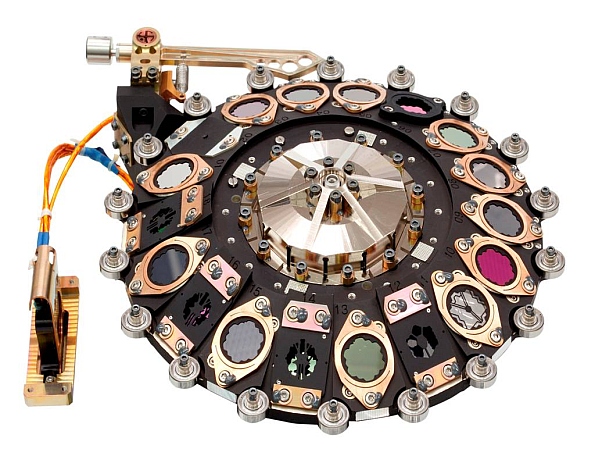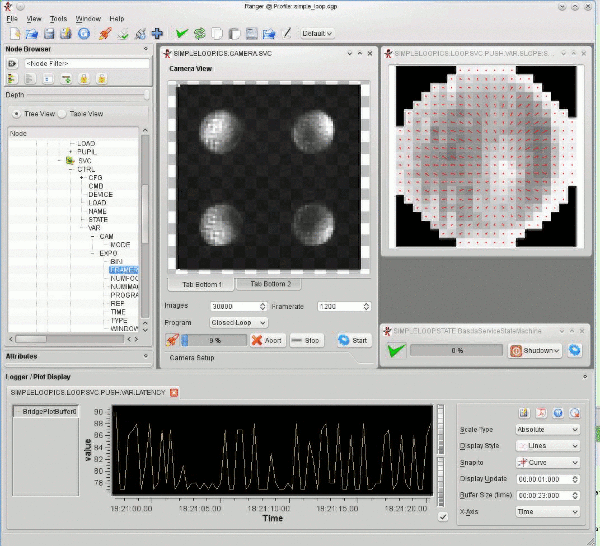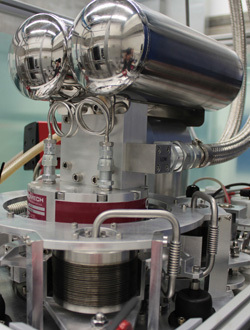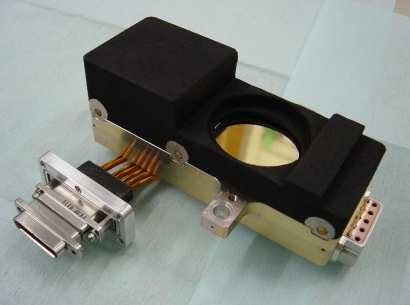| Version 495 (modified by , 3 years ago) (diff) |
|---|
The AstroTechTalk (ger) offers a place to discuss, for all interested colleagues and especially for the technical departments, the project leaders, the administration and the scientists as the ultimately users:
- status of instrumentation projects
- scientific tasks and features of the instruments in construction or planned
- new possible involvements
- technical innovations and developments
- technical problems and their solutions
- logistical problems and their solutions
- how to improve operation and observation
- project standards.
Time: Always Fridays 11:00 - 12:00 (during the construction work: 10:00 - 11:00)
Location: MPIA Hoersaal (during the construction work: HdA Auditorium)
Outline:
- Announcements (news, visitors, etc.) (mainly in German)
- Talk of about 30 min about a selected topic (German or English, will be announced)
- Follow up discussion and questions (German or English, depending on the speaker)
Proposals for talks: Please send an email to "hofferbert -at- mpia.de" or "naranjo -at- mpia.de" - alternatively you might reach us by phone (06221-528209 or -290) or in person (room 211 or 018) at MPIA.
| Date | Speaker | Topic |
| 11.09.2020 | -- | Summer holidays |
| 18.09.2020 | ||
| 25.09.2020 | ||
| 02.10.2020 (11hrs, Zoom) | Christian Fendt | Video-link: https://zoom.us/j/94315275031?pwd=S3lPUFVhYUxVb21BV0JKVGxjTHpDUT09 Astronomy for Non-Astronomers (Part 5) This lecture series is intended as further eduction for colleagues at MPIA who are NOT working as astronomers. We want to raise interest for this interesting field of research, maybe even raise enthusiasm. External guests are cordially invited as well. Parts 1 - 4 took place in the last semester (all recordings can be found here). In Part 5 and 6 of the lecture series the stars will be discussed - which features they have, how long they "live" (i.e. shine) and which processes run inside them. Presentation: German Slides/Recording: German Questions: German, English |
| 09.10.2020 | ||
| 16.10.2020 | ||
| 23.10.2020 | ||
| 30.10.2020 | -- | Autumn break |
| 06.11.2020 (11hrs, Zoom) | Christian Fendt | Video-link: https://zoom.us/j/94771491541?pwd=cm9LcGhJS2JTUThzR1FvSUFpNk1Kdz09 Astronomy for Non-Astronomers (Part 6) This lecture series is intended as further eduction for colleagues at MPIA who are NOT working as astronomers. We want to raise interest for this interesting field of research, maybe even raise enthusiasm. External guests are cordially invited as well. Parts 1 - 4 took place in the last semester (all recordings can be found here). In Part 5 and 6 of the lecture series the stars will be discussed - which features they have, how long they "live" (i.e. shine) and which processes run inside them. Presentation: German Slides/Recording: German Questions: German, English |
| 13.11.2020 | ||
| 20.11.2020 (11hrs, Zoom) | Markus Feldt | Video-link: https://zoom.us/j/98203911055?pwd=T0Fxekh2WWhWOGlmQW0rbEM0SmJBUT09 Astronomy for Non-Astronomers (Part 7) This lecture series is intended as further eduction for colleagues at MPIA who are NOT working as astronomers. We want to raise interest for this interesting field of research, maybe even raise enthusiasm. External guests are cordially invited as well. Parts 1 - 4 took place in the last semester (all recordings can be found here). In Part 5 and 6 of the lecture series the stars have been discussed. In this week's episode Markus Feldt will introduce planets and will take us on a journey featuring the search for exoplanets. Presentation: German Slides/Recording: German Questions: German, English |
| 27.11.2020 | ||
| 04.12.2020 (11hrs, Zoom Seminarroom) | Oliver Krause | Ultra-precise optical alignment mechanisms for the Roman Space Telescope (formerly WFIRST) The Nancy Grace Roman Space Telescope will be NASA's next astrophysics flagship mission after JWST and is due for launch in the mid 2020s. A novelty aboard is a powerful coronagraph system capable of direct imaging of exoplanet systems in reflected starlight at very high contrast ratios. The successful demonstration of such an instrument in space will pave the way to a future space missions aimed at imaging and characterizing faint Earth-like planets. MPIA is contributing six precision alignment mechanisms to the mission which are essential to control the optical beam in the adaptive-optics coronagraph instrument. All of this space hardware was designed at MPIA and significant parts are currently being produced at MPIA's mechanical workshop. The talk will describe the developments and tricky details of the mechanisms, the project setup at MPIA, and the story behind a successful collaboration with NASA's Jet Propulsion Laboratory in Pasadena. Presentation: German Slides: English Questions: German, English |
| 11.12.2020 | Wolfgang Gaessler | Video link: https://zoom.us/j/94819522811?pwd=Y0xkUW1oTTVKYlY2QmxudFQ3WElDQT09 Astronomy for Non-Astronomers (Part 8) "The Dark Side of the Universe" This lecture series is intended as further eduction for colleagues at MPIA who are NOT working as astronomers. We want to raise interest for this interesting field of research, maybe even raise enthusiasm. External guests are cordially invited as well. Parts 1 - 4 took place in the last semester. In Part 5 and 6 of the lecture series the stars have been discussed, and in Part 7 planets were introduced (all recordings can be found here). We will not hear about dark force during this talk, but we will learn about the dark matter and dark energy that seem to dominate our universe. While people have been speculating about dark matter for almost a hundred years, dark energy is a relatively young hypothesis. But what motivates the idea of this dark side of the universe? What does it mean for the evolution of the universe? Is there any explanation for it or is it possible to prove it? Or does "dark" here only mean that we just don't know anything? These questions will be addressed as part of the lecture series "Astronomy for non-Astronomers", presented by an astrophysicist, i.e. a non-astronomer. Presentation: German Slides/Recording?: German Questions: German, English |
| 18.12.2020 | ||
| 25.12.2020 | -- | Christmas break |
Preview:
DD.MM.2020 - Speaker: Title
Autumn 2020: Thomas Ruppel (SwissOptic AG): Modern fabrication of high-precision-optics -
a journey along the optical manufacturing chain
Autumn 2020: Natalie Fischer and Martin Wetz: Workshop program at the HdA
Autumn 2020: Ulf Seemann (ESO): Calibration Work
Postview:
Presentations from 12.09. - 31.12.2014
Presentations from 01.01. - 31.07.2015
Presentations from 01.08. - 31.12.2015
Presentations from 01.01. - 31.07.2016
Presentations from 01.08. - 31.12.2016
Presentations from 01.01. - 31.07.2017
Presentations from 01.08. - 31.12.2017
Presentations from 01.01. - 31.07.2018
Presentations from 01.08. - 31.12.2018
Presentations from 01.01. - 31.07.2019
Presentations from 01.08. - 31.12.2019
Attachments (11)
- instrum8_gr.jpg (82.6 KB) - added by 10 years ago.
- instrum4_gr.jpg (104.4 KB) - added by 10 years ago.
- pedv3_gr.jpg (213.9 KB) - added by 10 years ago.
- alfa3.5.gif (235.6 KB) - added by 10 years ago.
- CIAO.jpg (3.8 MB) - added by 8 years ago.
- linc_nirvana_labor.jpg (255.2 KB) - added by 8 years ago.
- MATISSE.jpg (43.1 KB) - added by 8 years ago.
- miri_fm_filterwheel.jpg (145.6 KB) - added by 8 years ago.
- PACS-Chopper.jpg (80.0 KB) - added by 8 years ago.
- simple_loop.gif (965.4 KB) - added by 8 years ago.
- teaser.jpg (13.5 KB) - added by 8 years ago.
Download all attachments as: .zip







